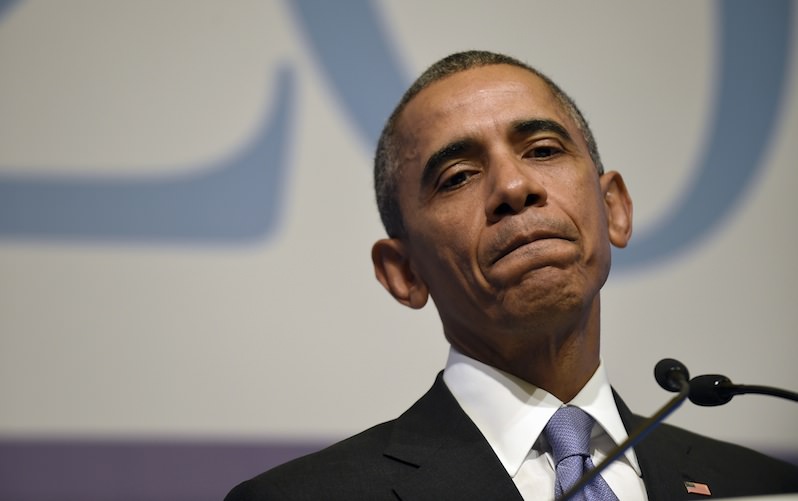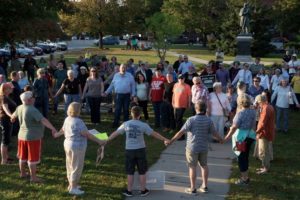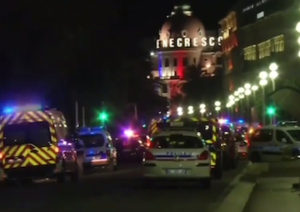What Would President Obama’s Critics Do About Islamic State?
As Paris mourns its dead, critics of President Obama's caution in the fight against Islamic State are full of sound and fury But those who throw around such words as "weak" and "feckless" should tell us if they support the logical alternative: sending in tens of thousands of US troops. President Barack Obama pauses during a news conference Monday after the G-20 Summit in Antalya, Turkey. (Susan Walsh / AP)
President Barack Obama pauses during a news conference Monday after the G-20 Summit in Antalya, Turkey. (Susan Walsh / AP)
As Paris mourns its dead, critics of President Obama’s caution in the fight against the Islamic State are full of sound and fury. But those who throw around such words as “weak” and “feckless” should tell us if they support the logical alternative: Sending in tens of thousands of U.S. troops.
READ: A Paris Moment for American Politics?
Clearly our nation has ample military strength to crush the murderous terrorists in Iraq and Syria. But what would be the cost in American lives? And would such action make us safer? Or would it likely have the opposite effect, guaranteeing more terrorism and strife?
Obama sounded defensive Monday as he faced reporters in Antalya, Turkey, where he was attending a G-20 summit that ended up being dominated by the Paris attacks. All weekend, commentators had mocked his recent declaration that the Islamic State was “contained.” There was little anyone could have done, the president argued, to prevent something like Friday’s rampage.
“If you have a handful of people who don’t mind dying, they can kill a lot of people,” Obama said, stating the tragically obvious.
The president’s approach — U.S. airstrikes plus support of friendly ground forces in Iraq and Syria — clearly has not worked, at least to this point. The Islamic State is no longer gobbling territory and in fact has lost a bit, but its leaders can still claim to have established and defended an Islamic “caliphate” that serves as magnet and inspiration for jihadist militants around the world.
Moreover, as we have seen in recent weeks, the Islamic State has expanded its focus to include targets abroad. The group has claimed credit for the downing of a Russian airliner in the Sinai, deadly bombings in Beirut and, of course, Friday’s merciless killings in and around the French capital.
Obama’s tone in addressing the Paris atrocity was all wrong. At times he was patronizing, at other times he seemed annoyed and almost dismissive. The president said, essentially, that he had considered all the options and decided that even a large-scale terrorist attack in the heart of a major European capital was not enough to make him reconsider his policy.
He is usually more skillful at conveying empathy, but it’s not hard to understand his frustration. No, his course of action hasn’t produced the desired results. But that is no reason to do what critics advocate, which the president summed up concisely: “Shoot first and aim later.”
Establish no-fly zones? That would have little effect on the Islamic State, which does not have an air force. It would have an impact on the forces of Syrian dictator Bashar al-Assad, so maybe this is something Obama could have done before Russia intervened with air power to support Assad’s regime. But creating a no-fly zone would have plunged the United States headfirst into the Syrian civil war.
Create safe zones for Syrian civilians and “moderate” rebels? In the absence of reliable and effective local military allies, carving out such refuges would require U.S. troops. Once again, we would be in the middle of the war.
The Republican presidential candidates talk a tough game, but only Lindsey Graham — who has so little support that he didn’t even make the last undercard debate — lays out an honest alternative to Obama’s policy. He proposes that the United States lead a coalition of up to 100,000 troops to eliminate the Islamic State and pacify Syria.
That’s a plan worth debating. My biggest question is whether this would, in the end, make the world a safer place. The experience of the past decade in Afghanistan and Iraq demonstrates how good the Western alliance is at creating power vacuums in the Middle East and how bad it is at filling them. It is hard to imagine that a new generation of jihadists would not quickly emerge, with a new set of grievances against the United States and its allies.
Jeb Bush says we should “declare war” against the Islamic State, which I believe our airstrikes have already done. Ted Cruz and others rail against Obama for not more stridently defining the enemy as “Islamic,” as if fighting terrorism were a matter of semantics.
“Every few months I go to Walter Reed, and I see a 25-year-old kid who is paralyzed or has lost his limbs, and some of those are people I’ve ordered into battle,” Obama said. “So I can’t afford to play some of the political games that others may.”
Critics should offer viable alternatives. Or they should stop playing their games.
Eugene Robinson’s email address is [email protected].
© 2015, Washington Post Writers Group
Your support matters…Independent journalism is under threat and overshadowed by heavily funded mainstream media.
You can help level the playing field. Become a member.
Your tax-deductible contribution keeps us digging beneath the headlines to give you thought-provoking, investigative reporting and analysis that unearths what's really happening- without compromise.
Give today to support our courageous, independent journalists.





You need to be a supporter to comment.
There are currently no responses to this article.
Be the first to respond.